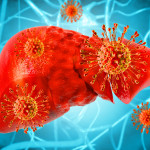A substantial number of people with HIV who are vaccinated against hepatitis A virus (HAV) maintain their initial antibody response to the virus for up to 10 years, according to a study published in the June 15 issue of The Journal of Infectious Diseases. The authors comment however, that because these response rates are still lower than in HIV-negative people, we should, perhaps be giving HIV-positive people an additional vaccine booster shot.
Hepatitis A—while not deadly like chronic hepatitis B virus (HBV) or hepatitis C virus (HCV)—does cause a serious and very unpleasant illness in many people. Symptoms of HAV infection include fevers, stomach upset and extreme fatigue, and they can sometimes last for more than two months.
Fortunately, there is a vaccine that protects people from contracting HAV. It is both effective and long lasting in HIV-negative people, but little is known about the vaccine’s efficacy and durability in people with HIV.
To address this unanswered question, Nancy Crum-Cianflone, MD, from the Naval Medical Center in San Diego, and her colleagues, looked backward at the medical records of 130 HIV-positive people enrolled in the U.S. Military HIV Natural History Study. Results from the HAV antibody tests were available for all participants at the one- and three-year mark following vaccination. Antibody results from six to 10 years after vaccination were available in a smaller group. Vaccines were given between 1996 and 2003, and people were followed until 2007.
The participants’ average age was 35, and just less than half had a viral load under 1,000 copies. Nine percent of the participants had chronic HBV infection, and 2 percent had chronic HCV infection at the time of vaccination.
Crum-Cianflone and her fellow scientists found that antibody responses were good in people with HIV, though not quite as good as in HIV-negative people. Eighty-nine percent of the HIV-positive study participants initially had strong antibody responses to the vaccine, compared with 100 percent of HIV-negative people from historical studies.
What’s more, antibody responses in those living with HIV were quite durable. In those who initially had good antibody responses, 90 percent maintained them for at least three years and 85 percent maintained them for between six and 10 years.
The research team found that a person’s CD4 count had an initial impact on vaccine durability. Those with a CD4 count over 350 were more likely to have an initial vaccine response than those with CD4s under 350. People with higher CD4s also had slightly higher antibody levels three years after vaccination, but after six years there was no difference.
Viral load, on the other hand, did have a lasting impact on a person’s initial response to the vaccine as well as his or her likelihood of maintaining that response over the long-term.
Another key finding was that the number of antibodies present in a tiny amount of blood over time was substantially lower in people with HIV than in their HIV-negative counterparts, and the number of antibodies present at between six and 10 years after vaccination began to approach ineffective levels.
The authors suggest that an additional booster shot of the vaccine might help improve initial response rates as well as help maintain antibody levels over time. They also conclude, “Maintaining [lower] HIV RNA levels among HIV-infected persons may be an important strategy for sustaining durable antibody levels for vaccine preventable infections such as hepatitis A virus.”
Advertisement
Advertisement
Advertisement





Comments
Comments